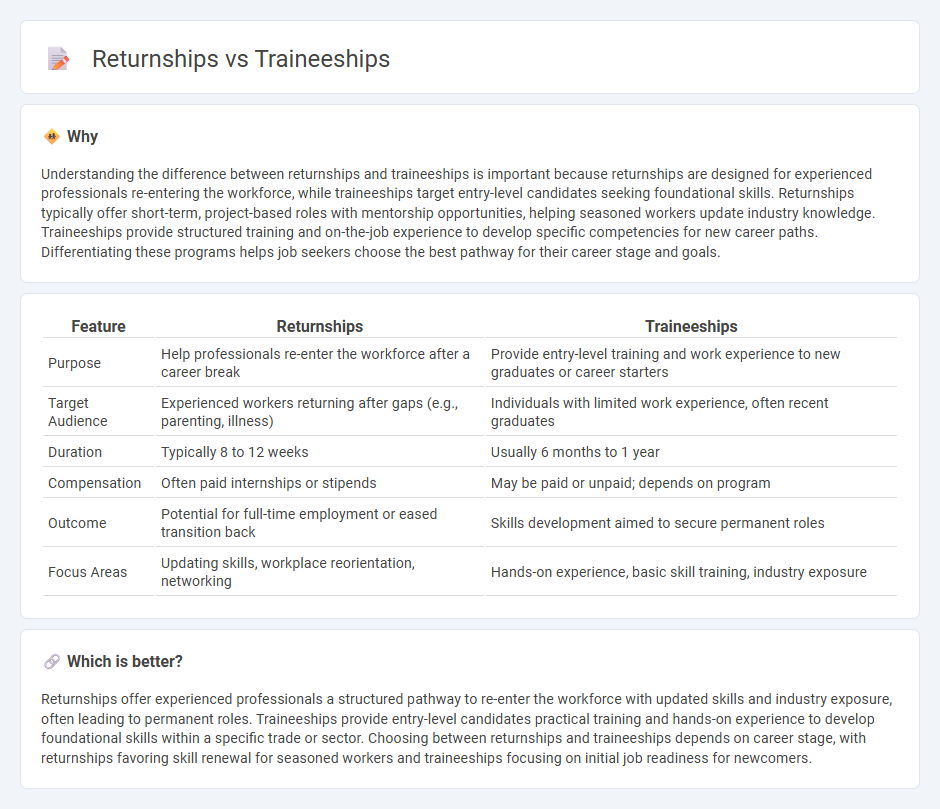
Returnships offer experienced professionals a structured pathway to re-enter the workforce after a career break, providing tailored training and mentorship. Traineeships focus on equipping newcomers or young adults with practical skills and work experience to kickstart their careers. Explore the key differences and benefits of returnships and traineeships to find the right employment opportunity for you.
Why it is important
Understanding the difference between returnships and traineeships is important because returnships are designed for experienced professionals re-entering the workforce, while traineeships target entry-level candidates seeking foundational skills. Returnships typically offer short-term, project-based roles with mentorship opportunities, helping seasoned workers update industry knowledge. Traineeships provide structured training and on-the-job experience to develop specific competencies for new career paths. Differentiating these programs helps job seekers choose the best pathway for their career stage and goals.
Comparison Table
| Feature | Returnships | Traineeships |
|---|---|---|
| Purpose | Help professionals re-enter the workforce after a career break | Provide entry-level training and work experience to new graduates or career starters |
| Target Audience | Experienced workers returning after gaps (e.g., parenting, illness) | Individuals with limited work experience, often recent graduates |
| Duration | Typically 8 to 12 weeks | Usually 6 months to 1 year |
| Compensation | Often paid internships or stipends | May be paid or unpaid; depends on program |
| Outcome | Potential for full-time employment or eased transition back | Skills development aimed to secure permanent roles |
| Focus Areas | Updating skills, workplace reorientation, networking | Hands-on experience, basic skill training, industry exposure |
Which is better?
Returnships offer experienced professionals a structured pathway to re-enter the workforce with updated skills and industry exposure, often leading to permanent roles. Traineeships provide entry-level candidates practical training and hands-on experience to develop foundational skills within a specific trade or sector. Choosing between returnships and traineeships depends on career stage, with returnships favoring skill renewal for seasoned workers and traineeships focusing on initial job readiness for newcomers.
Connection
Returnships and traineeships both serve as structured employment pathways designed to bridge skill gaps and reintroduce workers to the job market. Returnships specifically target individuals re-entering the workforce after a career break, offering temporary, mentorship-driven roles to update skills and rebuild professional networks. Traineeships focus on early-career individuals or those transitioning fields by providing formal training combined with practical work experience, facilitating smoother employment integration.
Key Terms
Skill Development
Traineeships offer structured programs targeting the acquisition of foundational skills for entry-level roles, often designed for recent graduates or career starters. Returnships cater specifically to professionals re-entering the workforce after a hiatus, emphasizing skill refreshment and industry reintegration. Explore comprehensive comparisons to understand which fits your career advancement goals best.
Career Re-entry
Traineeships offer structured programs for early-career professionals to gain practical experience and develop industry-specific skills, whereas returnships are designed specifically for individuals re-entering the workforce after an extended career break. Returnships provide tailored support, mentoring, and flexible opportunities to ease the transition back into professional roles, making them ideal for diverse career re-entry paths. Explore how these programs can accelerate your career re-entry and unlock new professional opportunities.
Mentorship
Mentorship in traineeships typically involves structured guidance for early career individuals seeking foundational skills, while returnships focus on experienced professionals re-entering the workforce with tailored support to update their expertise. Organizations offering these programs emphasize personalized mentorship to enhance learning and professional growth. Discover more about how targeted mentorship transforms career development through traineeships and returnships.
Source and External Links
Traineeships | HBO & WO | July 2025 - A traineeship is a full-time paid program lasting one to two years where you work in various departments of a company to gain broad experience and potentially secure a permanent position, with popular types including management, marketing, IT, and finance traineeships.
What Is A Traineeship? - Traineeships are short-term (six weeks to six months) work placements aimed at young people aged 16 to 23 who need skills or experience to progress towards apprenticeships or jobs, often unpaid but beneficial as a stepping stone into employment.
Stage USA - J1 Trainee Placements - J-1 traineeships in the US last 3 to 18 months, offering recent graduates the chance to develop skills and gain work experience with compensation of about $2500-$3000 per month in various fields such as marketing, finance, IT, and more.
 dowidth.com
dowidth.com